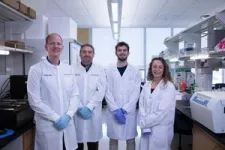(Press-News.org) June 6, 2024, Cleveland: Cleveland Clinic researchers found higher amounts of the sugar alcohol xylitol are associated with increased risk of cardiovascular events like heart attack and stroke.
The team, led by Stanley Hazen, M.D., Ph.D., confirmed the association in a large-scale patient analysis, preclinical research models and a clinical intervention study. Findings were published today in the European Heart Journal.
Xylitol is a common sugar substitute used in sugar-free candy, gums, baked goods and oral products like toothpaste. Over the past decade, the use of sugar substitutes, including sugar alcohols and artificial sweeteners, has increased significantly in processed foods that are promoted as healthy alternatives.
The same research team found a similar link between erythritol and cardiovascular risk last year. Xylitol is not as prevalent as erythritol in keto or sugar-free food products in the U.S. but is common in other countries.
“This study again shows the immediate need for investigating sugar alcohols and artificial sweeteners, especially as they continue to be recommended in combatting conditions like obesity or diabetes,” said Dr. Hazen, Chair of Cardiovascular and Metabolic Sciences at Cleveland Clinic’s Lerner Research Institute and Co-Section Head of Preventive Cardiology in the Heart, Vascular & Thoracic Institute. “It does not mean throw out your toothpaste if it has xylitol in it, but we should be aware that consumption of a product containing high levels could increase the risk of blood clot related events.”
In this new study, researchers identified that high levels of circulating xylitol were associated with an elevated three-year risk of cardiovascular events in an analysis of more than 3,000 patients in the U.S. and Europe. A third of patients with the highest amount of xylitol in their plasma were more likely to experience a cardiovascular event. To confirm the findings, the research team conducted pre-clinical testing and found that xylitol caused platelets to clot and heightened the risk of thrombosis. Researchers also tracked platelet activity from people who ingested a xylitol-sweetened drink versus a glucose-sweetened drink and found that every measure of clotting ability significantly increased immediately following ingestion of xylitol but not glucose.
The authors note that further studies assessing the long-term cardiovascular safety of xylitol are warranted. The research had several limitations, including that clinical observation studies demonstrate association and not causation. They recommend talking to your doctor or a certified dietitian to learn more about healthy food choices and for personalized recommendations.
The research is part of Dr. Hazen’s ongoing investigation into factors that contribute to residual cardiovascular risk. His team follows patients over time and finds chemical signatures in blood that can predict the future development of heart and metabolic disease. He has made pioneering discoveries in atherosclerosis and inflammatory disease research, including the seminal discovery linking gut microbial pathways to cardiovascular disease and metabolic diseases.
Dr. Hazen also directs Cleveland Clinic’s Center for Microbiome and Human Health and holds the Jan Bleeksma Chair in Vascular Cell Biology and Atherosclerosis.
The study was supported in part by National Institutes of Health and the Office of Dietary Supplements.
Disclosures: Dr. Hazen is named as co-inventor on pending and issued patents held by Cleveland Clinic in relation to cardiovascular diagnostics and therapeutics.
About Cleveland Clinic
Cleveland Clinic is a nonprofit multispecialty academic medical center that integrates clinical and hospital care with research and education. Located in Cleveland, Ohio, it was founded in 1921 by four renowned physicians with a vision of providing outstanding patient care based upon the principles of cooperation, compassion and innovation. Cleveland Clinic has pioneered many medical breakthroughs, including coronary artery bypass surgery and the first face transplant in the United States. Cleveland Clinic is consistently recognized in the U.S. and throughout the world for its expertise and care. Among Cleveland Clinic’s 77,000 employees worldwide are more than 5,658 salaried physicians and researchers, and 19,000 registered nurses and advanced practice providers, representing 140 medical specialties and subspecialties. Cleveland Clinic is a 6,699-bed health system that includes a 173-acre main campus near downtown Cleveland, 23 hospitals, more than 275 outpatient facilities, including locations in northeast Ohio; southeast Florida; Las Vegas, Nevada; Toronto, Canada; Abu Dhabi, UAE; and London, England. In 2022, there were 12.8 million outpatient encounters, 303,000 hospital admissions and observations, and 270,000 surgeries and procedures throughout Cleveland Clinic’s health system. Patients came for treatment from every state and 185 countries. Visit us at clevelandclinic.org. Follow us at twitter.com/ClevelandClinic. News and resources available at newsroom.clevelandclinic.org.
June 6, 2024, Cleveland: Cleveland Clinic researchers found higher amounts of the sugar alcohol xylitol are associated with increased risk of cardiovascular events like heart attack and stroke.
The team, led by Stanley Hazen, M.D., Ph.D., confirmed the association in a large-scale patient analysis, preclinical research models and a clinical intervention study. Findings were published today in the European Heart Journal.
Xylitol is a common sugar substitute used in sugar-free candy, gums, baked goods and oral products like toothpaste. Over the past decade, the use of sugar substitutes, including sugar alcohols and artificial sweeteners, has increased significantly in processed foods that are promoted as healthy alternatives.
The same research team found a similar link between erythritol and cardiovascular risk last year. Xylitol is not as prevalent as erythritol in keto or sugar-free food products in the U.S. but is common in other countries.
“This study again shows the immediate need for investigating sugar alcohols and artificial sweeteners, especially as they continue to be recommended in combatting conditions like obesity or diabetes,” said Dr. Hazen, Chair of Cardiovascular and Metabolic Sciences at Cleveland Clinic’s Lerner Research Institute and Co-Section Head of Preventive Cardiology in the Heart, Vascular & Thoracic Institute. “It does not mean throw out your toothpaste if it has xylitol in it, but we should be aware that consumption of a product containing high levels could increase the risk of blood clot related events.”
In this new study, researchers identified that high levels of circulating xylitol were associated with an elevated three-year risk of cardiovascular events in an analysis of more than 3,000 patients in the U.S. and Europe. A third of patients with the highest amount of xylitol in their plasma were more likely to experience a cardiovascular event. To confirm the findings, the research team conducted pre-clinical testing and found that xylitol caused platelets to clot and heightened the risk of thrombosis. Researchers also tracked platelet activity from people who ingested a xylitol-sweetened drink versus a glucose-sweetened drink and found that every measure of clotting ability significantly increased immediately following ingestion of xylitol but not glucose.
The authors note that further studies assessing the long-term cardiovascular safety of xylitol are warranted. The research had several limitations, including that clinical observation studies demonstrate association and not causation. They recommend talking to your doctor or a certified dietitian to learn more about healthy food choices and for personalized recommendations.
The research is part of Dr. Hazen’s ongoing investigation into factors that contribute to residual cardiovascular risk. His team follows patients over time and finds chemical signatures in blood that can predict the future development of heart and metabolic disease. He has made pioneering discoveries in atherosclerosis and inflammatory disease research, including the seminal discovery linking gut microbial pathways to cardiovascular disease and metabolic diseases.
Dr. Hazen also directs Cleveland Clinic’s Center for Microbiome and Human Health and holds the Jan Bleeksma Chair in Vascular Cell Biology and Atherosclerosis.
The study was supported in part by National Institutes of Health and the Office of Dietary Supplements.
Disclosures: Dr. Hazen is named as co-inventor on pending and issued patents held by Cleveland Clinic in relation to cardiovascular diagnostics and therapeutics.
About Cleveland Clinic
Cleveland Clinic is a nonprofit multispecialty academic medical center that integrates clinical and hospital care with research and education. Located in Cleveland, Ohio, it was founded in 1921 by four renowned physicians with a vision of providing outstanding patient care based upon the principles of cooperation, compassion and innovation. Cleveland Clinic has pioneered many medical breakthroughs, including coronary artery bypass surgery and the first face transplant in the United States. Cleveland Clinic is consistently recognized in the U.S. and throughout the world for its expertise and care. Among Cleveland Clinic’s 77,000 employees worldwide are more than 5,658 salaried physicians and researchers, and 19,000 registered nurses and advanced practice providers, representing 140 medical specialties and subspecialties. Cleveland Clinic is a 6,699-bed health system that includes a 173-acre main campus near downtown Cleveland, 23 hospitals, more than 275 outpatient facilities, including locations in northeast Ohio; southeast Florida; Las Vegas, Nevada; Toronto, Canada; Abu Dhabi, UAE; and London, England. In 2022, there were 12.8 million outpatient encounters, 303,000 hospital admissions and observations, and 270,000 surgeries and procedures throughout Cleveland Clinic’s health system. Patients came for treatment from every state and 185 countries. Visit us at clevelandclinic.org. Follow us at twitter.com/ClevelandClinic. News and resources available at newsroom.clevelandclinic.org.
END
Cleveland clinic-led study links sugar substitute to increased risk of heart attack and stroke
Xylitol is a common zero-calorie sweetener found in sugar-free candy and toothpaste
2024-06-06
ELSE PRESS RELEASES FROM THIS DATE:
Vigorous exercise may preserve cognition in high-risk patients with hypertension
2024-06-06
WINSTON-SALEM, N.C. – June 6, 2024 – People with high blood pressure have a higher risk of cognitive impairment, including dementia, but a new study from researchers at Wake Forest University School of Medicine suggests that engaging in vigorous physical activity more than once a week can lower that risk.
The findings appear online today in Alzheimer’s & Dementia: The Journal of the Alzheimer’s Association.
“We know that physical exercise offers many benefits, including lowering blood pressure, improving heart health and potentially delaying cognitive decline,” said Richard Kazibwe, ...
Sanders-Brown study: Long-read RNA sequencing reveals key gene expressions in Alzheimer’s disease
2024-06-06
LEXINGTON, Ky. — Researchers at the University of Kentucky Sanders-Brown Center on Aging are working to develop a pre-symptomatic disease diagnostic tool for Alzheimer’s disease.
“While the need for better treatments is clear, such treatments will not be very meaningful if they are administered after symptoms have onset. By then, Alzheimer’s disease has been ravaging the brain for decades to the point the brain can no longer compensate for the extreme cellular death,” said Mark ...
Women with excess weight as a teen or young adult may have higher stroke risk by age 55
2024-06-06
Research Highlights:
Women with excess weight at age 14 or 31 may have increased ischemic (clot caused) stroke risk before age 55. The same ischemic stroke risk was not found in men.
Losing excess weight after adolescence may not eliminate the stroke risk.
These findings are according to a study conducted in Finland that followed more than 10,000 people from birth into their 50s.
Researchers suggest health care professionals pay attention to overweight and obesity in young people and work with them to promote healthy eating and physical activity from an early age.
Embargoed ...
New glioblastoma treatment reaches human brain tumor and helps immune cells recognize cancer cells
2024-06-06
· Major advance for treatment of deadly brain cancer
· Clinical trial launched at Northwestern to test treatment
· Ultrasound microbubbles open blood-brain barrier to admit chemotherapy and immunotherapy cocktail
CHICAGO --- In a major advance for the treatment of the deadly brain cancer glioblastoma, Northwestern Medicine scientists used ultrasound technology to penetrate the blood-brain barrier and provide a small dose of a chemotherapy and immunotherapy drug cocktail. The study found that this treatment ...
Using oceanography to understand fronts and cyclones on Jupiter
2024-06-06
New research led by Lia Siegelman, a physical oceanographer at UC San Diego’s Scripps Institution of Oceanography, shows that the roiling storms at the planet Jupiter’s polar regions are powered by processes known to physicists studying Earth’s oceans and atmosphere. The geophysical commonalities spanning the 452 million miles between the two planets could even help facilitate an improved understanding of those processes on Earth.
Siegelman first made the connection between our planet and the gas giant in 2018 when she noticed a striking similarity between images of Jupiter’s huge cyclones and the ocean turbulence she was studying. ...
Ohio State develops searchable database for Alzheimer’s research
2024-06-06
COLUMBUS, Ohio – A searchable database is now ready to help study Alzheimer’s disease.
Neuroscience and biomedical informatics researchers at The Ohio State University Wexner Medical Center and College of Medicine created the comprehensive, user-friendly repository.
The free database – known as ssREAD – is outlined in a manuscript published online in Nature Communications.
Alzheimer’s disease is the most common cause of dementia, accounting for up to 80% of cases. An estimated 6.7 million Americans who are age 65 and older are living with Alzheimer's dementia today, according ...
Lifesaving childbirth blood loss intervention is highly cost-effective
2024-06-06
Economic analysis of the E-MOTIVE trial finds that average cost per patient of drape and treatment to save women’s lives incurs minimal additional cost compared with usual care, while significantly improving health outcomes.
The additional cost to achieve the improved outcome could be as little as 30 US cents extra- on average, compared to usual care.
Post-partum haemorrhage currently affects 14m women around the world and leads to 70,000 deaths a year which is equivalent to one woman dying every 6 minutes
A lifesaving package including early detection and bundled treatment for ...
Hidden challenges of tooth loss and dentures revealed in new study
2024-06-06
The hidden challenges faced by people with tooth loss and dentures has been identified by new research from the University of Sheffield.
Improvements in dental care, more people living longer and the social value placed on having a healthy smile has led to people keeping their own teeth longer, but it has also led to an increasing number of people needing some kind of restoration work including crowns, bridges and implants.
Many of these treatments remain unobtainable for most people due to the availability of NHS dentists and the high cost of private dental work. Removable dentures are often the only viable option for anyone experiencing tooth loss with an estimated ...
How medical models can transform agriculture
2024-06-06
Nano-agriculture: Sustainable solutions for global food security
PITTSBURGH—Researchers in the Department of Civil and Environmental Engineering at Carnegie Mellon University are using findings from nanomedicine and digital twin technologies to understand the new field of Plant Nanobiotechnology, address unsustainable agricultural practices, and meet increasing global food demands.
Currently, agriculture accounts for 14-28% of global greenhouse gas emissions and 70% of all freshwater withdraws. This, in addition to a range of other factors from extreme weather ...
World-first study into precision medicine for high-risk childhood cancer yields extraordinary results
2024-06-06
WORLD-FIRST STUDY INTO PRECISION MEDICINE FOR HIGH-RISK CHILDHOOD CANCER YIELDS EXTRAORDINARY RESULTS
VIDEO - https://www.youtube.com/watch?v=bwyugwVwNzc
In a world-first, Australian researchers and clinicians have shown that precision medicine – where treatment is tailored to an individual child’s cancer – leads to significantly improved outcomes in children with high risk cancer.
In a study published this week in the leading international journal Nature Medicine, the researchers found that precision medicine (also called personalised medicine) was shown to be superior to standard or non-guided therapy, both in terms of clinical response and survival.
A staggering ...
LAST 30 PRESS RELEASES:
Fossil amber reveals the secret lives of Cretaceous ants
Predicting extreme rainfall through novel spatial modeling
The Lancet: First-ever in-utero stem cell therapy for fetal spina bifida repair is safe, study finds
Nanoplastics can interact with Salmonella to affect food safety, study shows
Eric Moore, M.D., elected to Mayo Clinic Board of Trustees
NYU named “research powerhouse” in new analysis
New polymer materials may offer breakthrough solution for hard-to-remove PFAS in water
Biochar can either curb or boost greenhouse gas emissions depending on soil conditions, new study finds
Nanobiochar emerges as a next generation solution for cleaner water, healthier soils, and resilient ecosystems
Study finds more parents saying ‘No’ to vitamin K, putting babies’ brains at risk
Scientists develop new gut health measure that tracks disease
Rice gene discovery could cut fertiliser use while protecting yields
Jumping ‘DNA parasites’ linked to early stages of tumour formation
Ultra-sensitive CAR T cells provide potential strategy to treat solid tumors
Early Neanderthal-Human interbreeding was strongly sex biased
North American bird declines are widespread and accelerating in agricultural hotspots
Researchers recommend strategies for improved genetic privacy legislation
How birds achieve sweet success
More sensitive cell therapy may be a HIT against solid cancers
Scientists map how aging reshapes cells across the entire mammalian body
Hotspots of accelerated bird decline linked to agricultural activity
How ancient attraction shaped the human genome
NJIT faculty named Senior Members of the National Academy of Inventors
App aids substance use recovery in vulnerable populations
College students nationwide received lifesaving education on sudden cardiac death
Oak Ridge National Laboratory launches the Next-Generation Data Centers Institute
Improved short-term sea level change predictions with better AI training
UAlbany researchers develop new laser technique to test mRNA-based therapeutics
New water-treatment system removes nitrogen, phosphorus from farm tile drainage
Major Canadian study finds strong link between cannabis, anxiety and depression
[Press-News.org] Cleveland clinic-led study links sugar substitute to increased risk of heart attack and strokeXylitol is a common zero-calorie sweetener found in sugar-free candy and toothpaste









